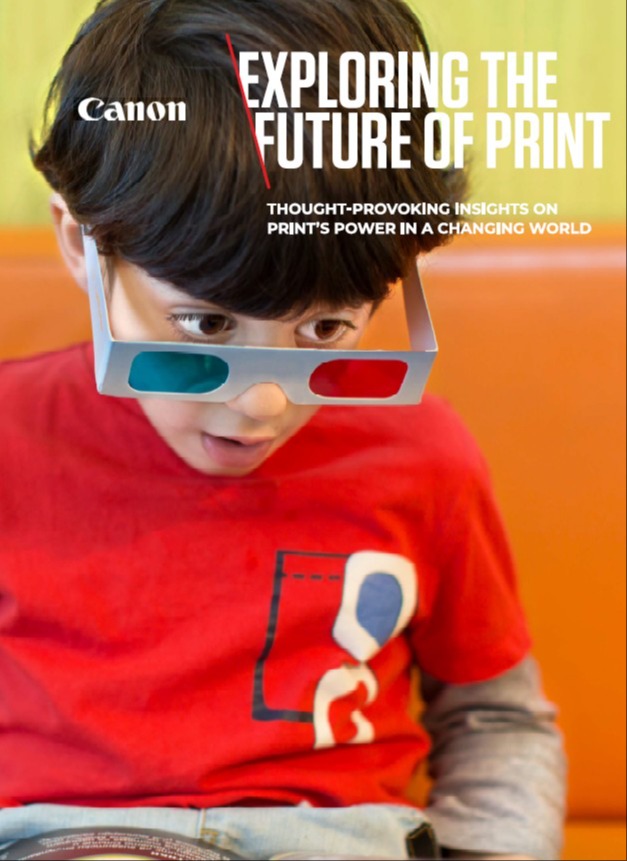Canon’s New Insight Report – ‘Exploring The Future of Print’ – Points To How Service Providers Can Adapt And Thrive Within A Changing Backdrop For Print.
Canon is sharing this new Insight Report with all quick print pros, titled ‘Exploring the Future of Print’, which seeks to understand the changing behaviours of brands and consumers and the impact these are having on the way that print is used and how print service providers operate. The research uncovered five key themes: print’s unique selling points (USPs) in a digital world, how brands can exploit these USPs to reach consumers, AI’s increasing role in print production, why sustainable production will be vital for future success, and the value of forward-looking partnerships.
It is the latest report in a series from Canon that, over the last 15 years, has shared print service providers’ and print buyers perspectives on the state of the industry, how digital print is evolving and its importance in driving business success. ‘Exploring the Future of Print’, however, goes beyond print decision makers and marketers to provide macro trends which will have significant implications for all print businesses and buyers – providing insights which will help to support them in making positive changes for the future of their businesses.
This latest market insight report consults four renowned ‘futurists’ whose jobs are to review and understand wider purchasing decisions, macro consumer trends, and transformational technologies. Through in-depth interviews, unique insights from these futurists have been combined with Canon’s own print industry expertise to deliver robust and actionable insights for PSPs for now and the future.
Insights uncovered across the five key themes include:
Insights on how to connect with younger generations who are increasingly spending more time online, whether that be to socialise, be entertained, or for educational purposes. As a result, there is an increasing consideration of how their identity and status are projected in what they buy and how they showcase those purchases. At the same time, consumers are aligning with brands with whom they share values. To this point, several futurists noted a direct connection between print’s unique physical characteristics and consumers’ desire to project identity and status. One reason brands continue to invest in print is because of the value perception it creates with consumers – especially due to the perceived time, effort and cost that it takes to produce it. And in an increasingly virtual world where it is getting harder to cut through the noise and communicate with consumers, physical objects are more appreciated, and this includes print. This creates a compelling argument for personalised print and the ‘Programmatic Print’ concept that enables brands to engage customers with communications that are timely and relevant.
In line with the above point, print has a strong USP in a digital world, which is driven by print’s haptic characteristics that ‘cut through’ digital ‘noise’. In an increasingly virtual world, consumers are seeking out and appreciate physical experiences and interactions more deeply. In recognition of this, the futurists highlighted how print’s presence encourages us to pause, consider and appreciate, and that PSPs can consider new ways to monetise on this by offering ‘attention as a service’. For example, with an out of home, point of sale or direct marketing piece delivered as part of a broader, joined up campaign.
The contribution of AI to the future of print was the most prominent discussion point, highlighting AI’s extraordinary potential. There was agreement among the futurists that, while businesses that use AI are expected to grow faster than those that don’t, the benefits of the technology will differ from business to business as will the rate of adoption. It is likely that every PSP will see the value of AI and automation across their entire business. However, it’s also important to note that, before integrating AI, PSPs need to ensure they have a robust IT infrastructure and data management in place and that they become ‘data literate’ so that they can advise their customers on how to leverage their data.
As with any industry, increasing emphasis on sustainable production will be essential for print’s future as regulators, brands and consumers increase the pressure for better ESG standards. Looking to the future, the report gives ideas on how printers can optimise their supply chain and demonstrate their sustainable practices, documenting recognised processes and procedures that reduce carbon emissions. Within the print ecosystem, printers can also help brands project their sustainable status and add value by making strategic environmental recommendations.
Throughout the market research, the futurists also highlighted the role that suppliers can play in helping their customers adjust to changing technology and market conditions and that PSPs should view themselves as a powerful connector between a brand and their customers by bringing consultative and proactive print expertise to cement their position as a trusted advisor.
Each of the futurists interviewed have extensive experience in their fields:
Benjamin Talin: Founder of More Than Digital, Benjamin has immersed himself in digital transformation and change management, with a focus on societal change and communications technologies, offering a practical take on the future for a broad spectrum of clients.
Murray Grubb: Sales Lead for central government at Salesforce and an AI consultant, Murray has over 20 years’ experience in transformation and digitisation across a wide range of IT and communications disciplines.
Beate van Loo-Born: A seasoned executive with over 20 years’ experience in financial services, data and climate finance in European, Asian and US financial centres.
Rafael Rodrigues: Drawing on his background in product management with a leading digital press manufacturer and in recent roles, Rafael has developed several e-commerce platforms and AI-based solutions.
Speaking about the Insight Report Duncan Smith, Country Director, Production, at Canon UK and Ireland, says, “We are committed to helping our customers navigate the changing print landscape and the associated challenges that come with it. This report is an extension of that promise and Canon’s ethos to encourage PSPs to share and learn from other businesses, not just in the short term, but for decades to come. For the last 15 years, our research reports have provided valuable insights to the print industry and allowed our customers to take a step back from day-to-day operations and consider how they can reshape their business for the future. In this latest Insight Report, we are providing high-level market intelligence from external experts that looks at familiar topics from an alternative viewpoint, to spark new ideas and debate. And although some of the macro trends are from beyond the print industry, many of these insights are highly relevant to print businesses today. ”
“The conclusions from the report are encouraging and cement print’s future as a valuable marketing medium that delivers cut through. The opportunities for PSPs are vast, but it’s also clear from the findings that PSPs need to continue to be curious and ask questions about AI and sustainability, and the steps they need to take to drive their business forward and keep creating value for brands. We’re confident that our market intelligence will continue to drive positive change within the industry and coupled with our innovative technologies and long-term business support, will give our customers the power to move forward and succeed against a changing backdrop for print.”
To find out more about the market research findings and to access the full report, visit:
www.canon.co.uk/business/insights/articles/insight-report-2025/



.jpg)









